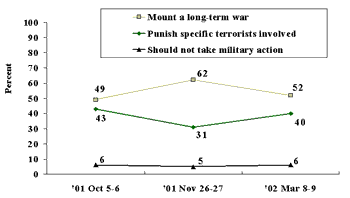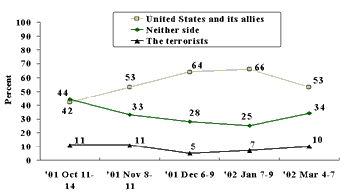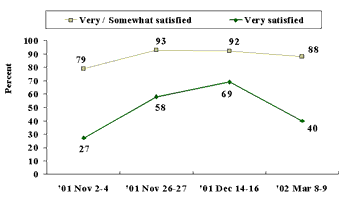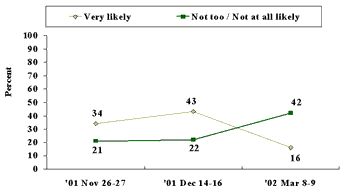GALLUP NEWS SERVICE
PRINCETON, NJ -- Increased fighting in Afghanistan near Gardez, resulting in the deaths of eight American soldiers last week, has pushed the war on terrorism back to the top of the news. New Gallup polls show that six months after the Sept. 11 terrorist attacks, support for the war effort remains high. While Americans remain upbeat in their overall assessment of the success of the military effort, fewer now believe the United States is currently winning the war on terrorism than did so in January, and fewer are "very satisfied" with the amount of progress made by the U.S. military in the war. There has also been a sharp decline in the percentage of Americans who believe it is very likely the United States will capture Osama bin Laden, leaving barely half of Americans optimistic that this will happen.
Nine in 10 Americans Approve of Military Action
Six months since the attacks on both the World Trade Center and the Pentagon, Americans continue to show overwhelming support for U.S. military action. The latest CNN/USA Today/Gallup poll, conducted March 8-9, shows 91% approve and only 7% disapprove of the current U.S. military action in the war on terrorism. Since the time of the Sept. 11 attacks, support for military action to fight terrorism has consistently hovered near 90%. About the same number (86%) say they would "probably support" President Bush's future decisions in the war on terrorism, including 31% who say they would definitely support them.
When asked what the objective of the military action should be, a slim majority of Americans (52%) favor mounting a long-term war to defeat global terrorist networks worldwide, while 40% favor more limited military action aimed only at punishing the specific terrorist groups responsible for the Sept. 11 attacks.
This marks a modest decline in support for a long-term war as Americans have become somewhat more divided in their opinions on this matter than they were in previous months. A November 26-27 CNN/USA Today/Gallup poll showed that 62% favored the broader military action while just 31% favored the more limited approach.
| How Should the United States Deal With Terrorism? |
 |
Assessments of War Progress Less Positive
Overall, Americans are generally positive in their assessment of how the war effort is going. However, two new polls show that the public is now less positive than they were earlier in the war effort. For example, a Gallup poll conducted March 4-7 shows that 53% of Americans think the United States and its allies are winning the war on terrorism, 10% think the terrorists are winning, and 34% say that neither side is winning. In January of this year, 66% said that the United States was winning the war.
| Who Is Winning the War on Terrorism? |
 |
Nearly nine in 10 say they are at least somewhat satisfied with the progress the U.S. military is making in the war on terrorism, which is essentially unchanged since Gallup first asked this in November. However, the percentage who say they are "very satisfied" has dropped significantly, from as high as 69% in December to just 40% now.
| Satisfaction With Progress in the War on Terrorism |
 |
Attitudes regarding U.S. military action in the war on terrorism are colored significantly by one's party affiliation. Republicans are much more likely to say the United States is winning the war (64%) than are independents (47%) and Democrats (48%). Fifty-one percent of Republicans are very satisfied with the U.S. progress in the war, compared with 38% of Democrats and 32% of independents.
Public Less Optimistic About Capturing Osama bin Laden
As months have passed without any obvious progress made toward capturing or killing Osama bin Laden, Americans have become less confident that the man thought responsible for the Sept. 11 terrorist attacks will ever be caught. The March 8-9 poll finds 55% of the public saying Osama bin Laden's capture is at least somewhat likely, while 42% think it is not very likely. In December, 76% thought his capture was at least somewhat likely and 22% -- roughly half of what it is now -- thought it was not very likely. Currently, only 16% believe that it is "very likely" the United States will be able to capture Osama bin Laden, down substantially from 43% in December.
| How Likely Is It That the United States Will
Be Able to Capture or Kill Osama bin Laden? |
 |
Nevertheless, there has been no change in the perception of whether Osama bin Laden's capture is necessary for the military action to be a success. Currently, 47% of Americans say the United States' accomplishments in Afghanistan will be a success even if Osama bin Laden is not captured, while 48% say the efforts will not be a success until he is found. In January, the percentages were 44% and 50%, respectively.
Political Aspects of the War
In recent weeks, the war effort has taken on political overtones, with some Democrats in Congress criticizing the Bush administration for its lack of communication with them over war plans and spending on the war effort. On March 8, the Senate passed a resolution, designed to smooth over some of the differences, which affirmed its support for the administration's war policies.
So far, few Americans find fault with either party:
- Seventy-five percent of Americans say they approve of the way the Bush administration is handling communications with Congress over the war on terrorism, while just 18% disapprove.
- Americans are also generally satisfied with the government's efforts to fund the war on terrorism. Nearly two-thirds of Americans (65%) say the government is spending the right amount to fight the war on terrorism. Just 18% say too much is being spent, and only 13% think the government is spending too little.
- A majority of the public (61%) believes that the Democratic leaders in Congress have shown the right amount of support toward the Bush administration's policies in the war on terrorism. Eight percent say they have been too supportive, and 23% say they have not been supportive enough.
Survey Methods
These results are based on telephone interviews with randomly selected national samples of 1,006 adults, 18 years of age and older, conducted March 4-7, 2002; and 802 adults, 18 years of age and older, conducted March 8-9, 2002. For results based on these samples, one can say with 95 percent confidence that the maximum error attributable to sampling and other random effects is + / - 3 percentage points and + / - 4 percentage points, respectively. In addition to sampling error, question wording and practical difficulties in conducting surveys can introduce error or bias into the findings of public opinion polls.
Who do you think is currently winning the war against terrorism -- [ROTATED: the U.S. and its allies, neither side, or the terrorists]?
|
United States and |
Neither |
The |
No |
|
|
War on terrorism |
% |
% |
% |
% |
|
2002 Mar 4-7 |
53 |
34 |
10 |
3 |
|
2002 Jan 7-9 |
66 |
25 |
7 |
2 |
|
2001 Dec 6-9 ^ |
64 |
28 |
5 |
3 |
|
2001 Nov 8-11 |
53 |
33 |
11 |
3 |
|
2001 Oct 11-14 |
42 |
44 |
11 |
3 |
|
^ Based on full sample |
||||
Do you approve or disapprove of the way the Bush Administration is handling communication with Congress over the war on terrorism?
|
Approve |
Disapprove |
No opinion |
|
|
2002 Mar 4-7 |
75% |
18 |
7 |
Do you approve or disapprove of the current U.S. military action in the war on terrorism?
|
|
Approve |
Disapprove |
No opinion |
|
|
% |
% |
% |
||
|
2002 Mar 8-9 |
91 |
7 |
2 |
|
|
2002 Jan 25-27 ^ |
89 |
9 |
2 |
|
|
2001 Dec 6-9 ^ |
88 |
9 |
3 |
|
|
2001 Nov 26-27 ^ |
92 |
6 |
2 |
|
|
2001 Nov 2-4 ^ |
86 |
11 |
3 |
|
|
2001 Oct 19-21 ^ |
88 |
10 |
2 |
|
|
^ |
Do you approve or disapprove of the current U.S. military action in Afghanistan? |
|||
How satisfied are you with the amount of progress made by the U.S. military in the war on terrorism -- very satisfied, somewhat satisfied, not too satisfied, or not at all satisfied?
|
Very |
Somewhat satisfied |
Not too satisfied |
Not at all satisfied |
No |
||
|
2002 Mar 8-9 |
40% |
48 |
8 |
2 |
2 |
|
|
2001 Dec 14-16 ^ † |
69% |
23 |
5 |
2 |
1 |
|
|
2001 Nov 26-27 † |
58% |
35 |
4 |
2 |
1 |
|
|
2001 Nov 2-4 ^ † |
27% |
52 |
11 |
7 |
3 |
|
|
^ |
Asked of a half sample. |
|||||
|
† |
WORDING: How satisfied are you with the amount of progress made by the U.S. military in the war in Afghanistan -- very satisfied, somewhat satisfied, not too satisfied, or not at all satisfied? |
|||||
Which of the following comes closest to your view about the actions the United States should take to deal with terrorism -- [ROTATED: the U.S. should mount a long-term war to defeat global terrorist networks, the U.S. should take military action ONLY to punish specific terrorist groups responsible for the attacks on the World Trade Center, or the U.S. should not take military action but should rely only on economic and diplomatic efforts to deal with terrorism]?
|
Mount long- |
Punish specific terrorists involved |
Should not take military action |
No |
|
|
2002 Mar 8-9 |
52% |
40 |
6 |
2 |
|
2001 Nov 26-27 |
62% |
31 |
5 |
2 |
|
2001 Oct 5-6 |
49% |
43 |
6 |
2 |
Thinking about the decisions President Bush might make in the future concerning where to send troops or other military decisions, do you think you would -- [ROTATED: definitely support Bush's decisions, probably support them, probably not support them, (or) definitely not support Bush's decisions]?
|
Definitely support |
Probably support |
Probably not support |
Definitely not support |
No |
|
|
2002 Mar 8-9 |
31% |
55 |
9 |
2 |
3 |
Do you think the Democratic leaders in Congress -- [ROTATED: have been too supportive, have shown the right amount of support, or have not been supportive enough] -- toward the Bush administration's policies in the war on terrorism?
|
Too |
Right amount |
Not supportive enough |
No |
|
|
2002 Mar 8-9 |
8% |
61 |
23 |
8 |
How likely is it that the U.S. will be able to capture or kill Osama bin Laden -- very likely, somewhat likely, not too likely, or not at all likely?
|
Very |
Somewhat |
Not too |
Not at all |
No |
|
|
2002 Mar 8-9 |
16% |
39 |
29 |
13 |
3 |
|
2001 Dec 14-16 |
43% |
33 |
16 |
6 |
2 |
|
2001 Nov 26-27 |
34% |
44 |
15 |
6 |
1 |
Which comes closer to your view -- [ROTATED: the U.S. accomplishments in Afghanistan will be a success even if Osama bin Laden is not captured, (or) the U.S. accomplishments in Afghanistan will not be a success until Osama bin Laden is captured]?
|
|
|
|
Both/Neither (vol.) |
No |
|
2002 Mar 8-9 |
47% |
48 |
4 |
1 |
|
2002 Jan 11-14 |
44% |
50 |
4 |
2 |
|
2001 Nov 26-27 |
41% |
55 |
2 |
2 |
|
(vol.) Volunteered response |
||||
Do you think the United States is spending -- [ROTATED: too much money, about the right amount, or too little money] -- to fight the war on terrorism?
|
Too much |
Right amount |
Too little |
No opinion |
|
|
2002 Mar 8-9 |
18% |
65 |
13 |
4 |
